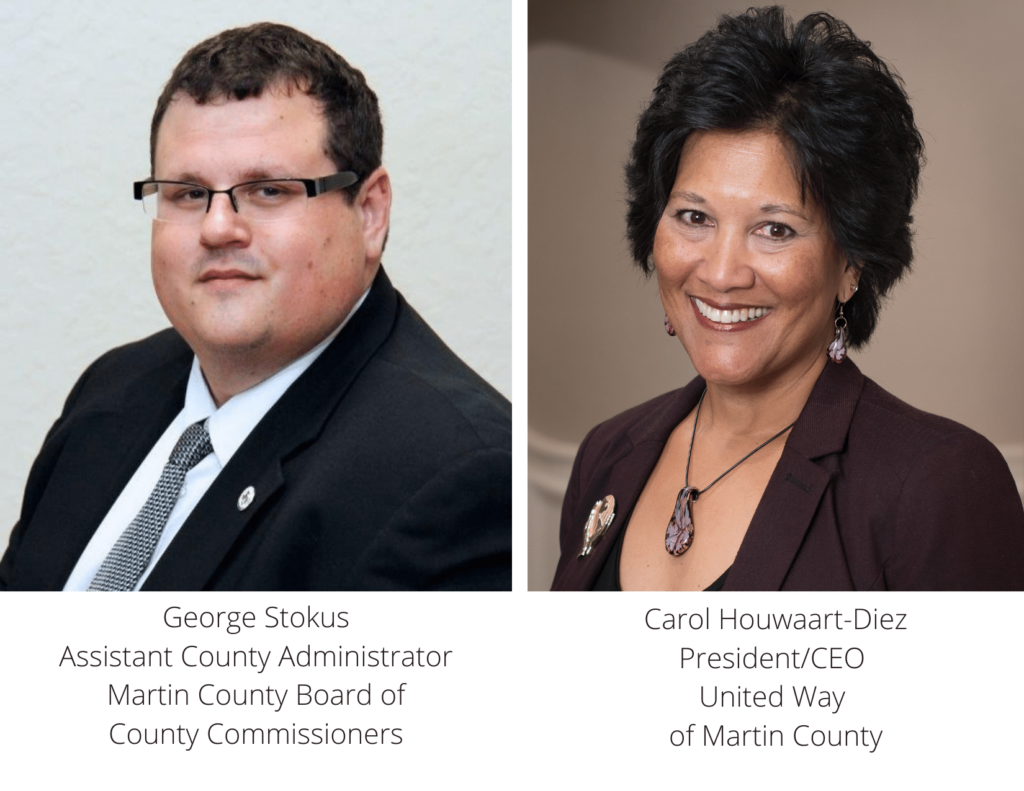In December 2020, the Business Development Board’s annual awards ceremony honored the leadership of Martin County for its swift and well-coordinated effort to direct and distribute federal relief dollars to individuals harmed by the pandemic.
To somewhat less fanfare, the county—in collaboration with United Way of Martin County—is currently leading another relief effort to address economic needs. From key capital projects with economic benefits to programs aimed at strengthening the workforce, dollars from the federal American Rescue Plan Act (ARPA) are working their way through our economy. George Stokus, Martin County deputy administrator, and Carol Houwaart-Diez, president/CEO of United Way of Martin County, shared more about the ongoing effort.
You’ve been tasked with teaming with United Way of Martin County to disperse federal dollars from the American Rescue Plan Act (ARPA) to local entities involved in everything from social services to economic assistance. Where are those efforts right now?
George: The Board of Martin County Commissioners has allocated the full $64 million from the American Rescue Plan Act dollars and we’ve begun the initial allocations, including $1.6 million to accelerate temporary employment programs, such as the Stuart/Martin Chamber’s Career Connect, Project LIFT, House of Hope and more. These are programs aimed at getting individuals trained and into the workforce.
We recently spoke at length to Joe Catrambone and Angela Hoffman of the Stuart Chamber about the Career Connect program, which compensates job prospects during a generalized—and later specialized—training period, and then compensates employers to bring them on, in essence minimizing risks for both.
George: That’s correct.
What do some of these other programs do?
George: For some examples, ARC of Martin County received $450,000 to build their Caring Café, a program that helps adults who are developmentally challenged and segueing in the workforce to develop job skills in retail and hospitality industries so they can be more self-sufficient. YMCA of the Treasure Coast received $100,000 for its training daycare program. Boys & Girls Clubs of Martin County received $250,000 for its culinary program, which trains and certifies young people for careers in hospitality.
So a lot of money was dedicated toward these innovative, job-creation programs?
George: Yes. But we also spent the bulk of our money—about $13 million—on capital infrastructure assistance for septic-to-sewer conversion and broadband infrastructure. So, the investment that BOCC has made for economic assistance and infrastructure allows existing businesses to either remain in the county or expand within their existing footprint. That’s not only healthier for the environment but having a business that’s located in an area and more resilient to flooding and hurricanes and able to come back in a quicker period, is always good for business. A lot of this is complemented through our assistance with FPL and their storm-hardening processes and our stormwater projects. When you’re not getting flooded, you’re able to get power up and quickly—and you’re able to get back to the worksite.
You also mentioned expanded broadband infrastructure?
George: That’s right. We’re cognizant that we need to have connectivity to address the at-home businesses. So we’re collaborating with Internet providers for greater connectivity. We clearly saw an increase for broadband demand—especially in the Palm City Farms area. During covid, we saw a lot of people working from home and the creation of a lot of cottage businesses. And they want broadband, and they clearly made that known to us.
What are some other interesting programs to receive funds?
George: Well, we want individuals to be involved in the arts for the mental health aspects that accompany it as well as for the entrepreneurial benefits. So we’re looking at places such as Golden Gate where residents can learn about art and convert that artistic talent and knowledge into a cottage industry. We also have a reach center to reimagine education—non-traditional assistance in a non-traditional setting with two main focuses: aviation and marine while getting people upskilled and learning English as a second language.
We know that the United Way of Martin County is playing a key role in this effort (more below). Are there other community partners involved?
George: We’re working in collaboration with the City of Stuart, of course the Business Development Board, the Economic Council, and the Treasure Coast Regional Planning Council to find a way to redevelop the aging infrastructure of the Stuart Business Park. We think we’ll be able to leverage further federal dollars as we hope to address stormwater issues, induce businesses to convert from septic to sewer and address the road scape of that industrial park. We’re getting a good inventory of what’s there and creating, ultimately, a vision plan of what that area will become and how the city and county can work as a team to better the local economy. That’s the full $31 million of APRA.
And of course you have to account for the expenditure of every penny, I would imagine?
George: Absolutely. We have to report back to ARPA for every single dollar for audit purposes. For certain programs, staff is assigned, and the budget process is involved in the allocation of funds. We receive an invoice from either the department or the entity that received the ARPA funds. That invoice is reviewed by my office, the Office of Management & Budget, and then it’s paid by Martin County Clerk of Court & Comptroller. The county has to provide a quarterly report to the Treasury Department and we have to conduct audits on all the funds. We’ve contracted with the United Way of Martin County and they’ve made sure that each individual vendor is living up to the grant they’ve requested.
How has this effort increased your understanding of how our nonprofits serve the community?
George: This whole process has really opened my eyes into how important the nonprofits are in our economy and how they’re adjusting quickly to the needs of the community and still remain consistent to their core missions. I don’t know how we would effectively provide services to our community without the help and aid of our nonprofits. I don’t think it will be possible.
Carol, how long has United Way of Martin County been involved in this effort?
Carol: We started having conversations last March of 2021—prior to the money even coming into Martin County—and looking at what we could do, especially in the nonprofit sector, to see how this money could make an impact in our community. It just took a long time for the money to get here.
What can you share about the United Way’s role?
Carol: We’re in a key position because we work with so many partners in the community. We’re able to look at the big picture, so it was a great fit to work with the commission and make a change for the future—not just a temporary fix. That’s the key difference between the (federal) CARES relief dollars—which get the money out right away—and APRA, which allows us to be thoughtful in our approach and aim to make systematic changes.
Was the United Way able to serve in this role involving federal dollars due to its status as a national charity?
Carol: Actually, it had more to do with our relationships with the county government. I’ve learned that not all United Way chapters work with their local governments the way we do in Martin County. In Florida, specifically, we’re a little more progressive in that there’s better relationships with local governments. So yes, our national position is advantageous, but we’re also fortunate to have such a good working relationship with our county commissioners.
We imagine this experience gave you an even greater understanding of the societal needs that COVID inflicted on our community.
Carol: Definitely. CARES relief was a lifeline, but coming out of covid—we, the collective we—have done a good job of pivoting and seeing how we can get money out to those who need it most.
This must have been a really sobering responsibility for your organization to take on.
Carol: It’s been one of the most rewarding things I’ve done in my career—and I’ve done this for almost 35 years, six in Martin County—to be able to help my community at a time when there’s such a crisis in our world. First, to be able to assist our community, on a personal level, is just so rewarding.
Do you think the average resident understands just how effectively the county and its partners worked to disperse this relief?Carol: Those who want to know certainly do. But for the overall general community, probably not. But this community should be really proud of the partnership that has opened up over the last two years. Not that the relationships weren’t there before, but how much stronger they are now, and what this teamwork has been able to accomplish for our community.


